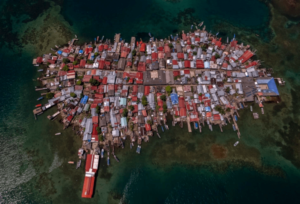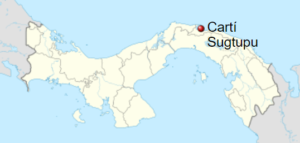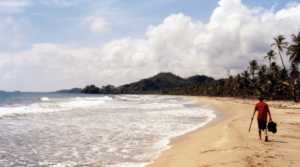Panama becomes the first nation to evacuate due to climate change
Panama has become the first country to carry out mass evacuations due to climate change. It is evacuating over 300 Guna families from the picturesque island of Gardi Sugdub (Carti Sugtupu) because of rising sea levels.
Located in the Narganá Township of Panama’s Guna Yala province (formerly San Blas Islands), Gardi Sugdub is about 366 meters in length and 137 meters in width. It is one of nearly 50 inhabited islands along the coasts of Panama, with a rich and vibrant history that is now being slowly swallowed by the Caribbean Sea.

The Panamanese government has begun resettling the evacuated families in new homes on the mainland of Guna Yala Comarca, roughly 2.5 km from the island of Gardi Sugdub.
A resident of the sinking island told AP, “We’re a little sad, because we’re going to leave behind the homes, we’ve known all our lives, the relationship with the sea, where we fish, where we bathe and where the tourists come, but the sea is sinking the island little by little.”
Panama prepares to evacuate first island in face of rising sea levels
300 families, who have thrived for generations on Hardi Sugdub will soon relocate to the mainland. Gardi Sugdub is the first of 63 coastal communities in Panama, that government officials will move due to… pic.twitter.com/HJo5UwZZi2
— Jason Smith – 上官杰文 (@ShangguanJiewen) June 2, 2024
The majority of the island’s older generation are aware that relocation will surely mean eventual death of their vibrant culture associated with the sea. However, they consider it a far more bearable fate that being swallowed by the sea.

Climate scientists have long warned that uncontrolled GHG (greenhouse gas) emissions coupled with accelerated melting of the polar ice caps will result in rising sea levels, directly affecting over 80% of coastal communities in the world by 2050.
According to AP reports, over 63 communities living along Panama’s Pacific and Caribbean coasts are set to meet a similar fate in the coming decades. Rising sea levels slowly poison the majority of the island’s freshwater reserves, while higher ocean temperatures pave the way for stronger storms that devastate coastal communities more than any other.
Panamanian govt paints a grim picture of climate change
Ligia Castro, climate change director of Panama’s Environmental Ministry, has disclosed that the relocation cost of the majority of at-risk coastal communities in the near future will be an astonishing $1.2 billion.
The small Latin American nation has been largely dependent on the IMF (International Monetary Fund) and the World Bank to rejuvenate its stagnant economy in the aftermath of the COVID-19 pandemic.

Therefore, it is unclear at the moment whether the nation will be able to accomplish its task of evacuating indigenous communities that face extinction from rising sea levels.
But it can be said for sure that without the world’s attention and resources, smaller nations like Panama, which have already reached the frontlines of climate change, are at risk of being overrun.

Several of the world’s major tourist destinations, like Bangkok, Venice, Miami, and Mumbai, also face a similar fate of death from rising sea levels in the coming future. Unless humans address climate change unitedly, small and impoverished nations will bear the initial brunt of the effects of climate change.











